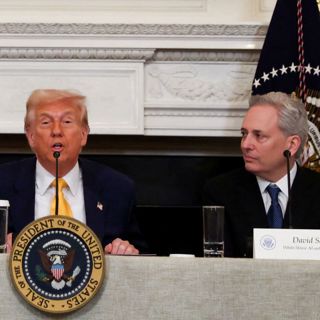
A Climate Warning From the Fertile Crescent
As the Middle East braces for another year of extreme heat, climate change is turning the soil to dust in the landscape that has long been known as the fertile crescent — and water has become a new source of conflict.Alissa J. Rubin, who covers the Middle East, tells the story of Iraq’s water crisis and what it means for the world.Guest: Alissa J. Rubin, a senior Middle East correspondent for The New York Times.Background reading: From 2023: A climate warning from the cradle of civilization.For more information on today’s episode, visit nytimes.com/thedaily. Transcripts of each episode will be made available by the next workday. Photo: Bryan Denton for The New York Times Unlock full access to New York Times podcasts and explore everything from politics to pop culture. Subscribe today at nytimes.com/podcasts or on Apple Podcasts and Spotify.
6 Maj 28min

You Have Questions About the Economy. We Have Answers.
At a time of enormous economic upheaval and uncertainty prompted by President Trump’s trade war, we asked our listeners what they wanted to understand about this financial moment.Ben Casselman, the chief economics correspondent for The New York Times, tries to answer some of those questions.Guest: Ben Casselman, the chief economics correspondent for The New York Times.Background reading: The U.S. economy shrank in the first quarter, in a reading clouded by messy trade data.Video: How Mr. Trump’s shifting tariffs could accelerate a recession.For more information on today’s episode, visit nytimes.com/thedaily. Transcripts of each episode will be made available by the next workday. Photo: Angela Weiss/Agence France-Presse via Getty Images Unlock full access to New York Times podcasts and explore everything from politics to pop culture. Subscribe today at nytimes.com/podcasts or on Apple Podcasts and Spotify.
5 Maj 32min

The Sunday Read: ‘This Is the Holocaust Story I Said I Wouldn’t Write’
When Taffy Brodesser-Akner became a writer, Mr. Lindenblatt, the father of one of her oldest friends, began asking to tell his story of survival during the Holocaust in one of the magazines or newspapers she wrote for. He took pride in telling his story, in making sure he fulfilled what he felt was the obligation of all Holocaust survivors, which was to remind the world what had happened to the Jews.His daughter Ilana knew it was a long shot but felt obligated to pass on the request — it was her father, after all. Taffy declined because after a life hearing about the Holocaust, she said, she was “all Holocausted out.”But, years later, when she learned of Mr. Lindenblatt’s imminent passing, Taffy asked herself what would become of stories like his if the generation of hers that was supposed to inherit them had taken the privilege that came with another generation’s survival and decided not to listen?So here it is, an old Jewish story about the Holocaust and a man who somehow survived the pernicious, organized and intentional genocide of the Jews. But right behind it, just two generations later, is another story, one about the children and grandchildren who have been so malformed by the stories that are their lineage that some of them made just as eager work of running from it, only to find themselves, same as anything you run from, having to deal with it anyway. Unlock full access to New York Times podcasts and explore everything from politics to pop culture. Subscribe today at nytimes.com/podcasts or on Apple Podcasts and Spotify.
4 Maj 1h 6min

'The Interview': Ocean Vuong Was Ready to Kill. Then a Moment of Grace Changed His Life.
The poet and novelist on the real reason he became a writer.Unlock full access to New York Times podcasts and explore everything from politics to pop culture. Subscribe today at nytimes.com/podcasts or on Apple Podcasts and Spotify.
3 Maj 49min

Family Separation 2.0
In his first 100 days in office, President Trump has struggled to fulfill his promise to carry out mass deportations, a reality that has prompted his administration to change its strategy.Rather than putting its focus on migrants with a criminal record, or those who recently crossed the border, the White House is increasingly seeking to deport those who came to the United States decades ago and have established a life, career and family in America.Jessica Cheung, a producer on “The Daily,” tells the story of one such migrant through the eyes of his daughter.Guest: Jessica Cheung, a senior producer at The New York Times, working on “The Daily.”Background reading: The Trump administration is frustrated over the pace of deportations.Inside a chaotic U.S. deportation flight to Brazil.For more information on today’s episode, visit nytimes.com/thedaily. Transcripts of each episode will be made available by the next workday. Photo: Jose Luis Gonzalez/Reuters Unlock full access to New York Times podcasts and explore everything from politics to pop culture. Subscribe today at nytimes.com/podcasts or on Apple Podcasts and Spotify.
2 Maj 27min

The Crypto President
President Trump was once a loud skeptic of cryptocurrency — one who called it a haven for drug dealers and scammers. But over the past few months, he’s emerged as the industry’s biggest cheerleader.A New York Times investigation shows how much the president and his family have profited from that transformation.Eric Lipton, an investigative reporter for The Times, discusses what happens when the country’s top crypto policymaker is himself a crypto entrepreneur.Guest: Eric Lipton, an investigative reporter for The New York Times.Background reading: The rise of Trump’s crypto firm.For more information on today’s episode, visit nytimes.com/thedaily. Transcripts of each episode will be made available by the next workday. Photo: Evelyn Hockstein/Reuters Unlock full access to New York Times podcasts and explore everything from politics to pop culture. Subscribe today at nytimes.com/podcasts or on Apple Podcasts and Spotify.
1 Maj 29min

100 Days
On Tuesday, the second Trump presidency officially reached the 100-day mark.It’s been a hundred days of transformation, tariffs, retribution, firings and deportation the likes of which America has never seen before.The Times journalists Michael Barbaro, Maggie Haberman, Jonathan Swan and Charlie Savage sit down to assess President Trump’s record.Guest:Maggie Haberman, a White House correspondent for The New York Times.Jonathan Swan, a White House reporter for The New York Times.Charlie Savage, who covers national security and legal policy for The New York Times.Background reading: 100 days into President Trump’s second term: What has changed?Mr. Trump’s 100-day report card.Eight charts that sum up Mr. Trump’s first 100 days.For more information on today’s episode, visit nytimes.com/thedaily. Transcripts of each episode will be made available by the next workday. Photo: Eric Lee/The New York Times Unlock full access to New York Times podcasts and explore everything from politics to pop culture. Subscribe today at nytimes.com/podcasts or on Apple Podcasts and Spotify.
30 Apr 33min

The Housing Market Has New Rules. Realtors Are Evading Them.
Last year, a historic legal settlement resulted in sweeping rule changes that were supposed to lower the price of buying and selling a home across the country.But those changes would cost real-estate agents money, and so those agents, it turns out, have found ways around the new rules.Debra Kamin, who reports on real estate, explains how they did it.Guest: Debra Kamin, a reporter for the real estate section of The New York Times.Background reading: Home sellers and buyers have accused real-estate agents of blocking lower fees.The rule change was the result of a legal settlement last year by the National Association of Realtors.For more information on today’s episode, visit nytimes.com/thedaily. Transcripts of each episode will be made available by the next workday. Photo: Jamie Kelter Davis for The New York Times Unlock full access to New York Times podcasts and explore everything from politics to pop culture. Subscribe today at nytimes.com/podcasts or on Apple Podcasts and Spotify.
29 Apr 30min






















